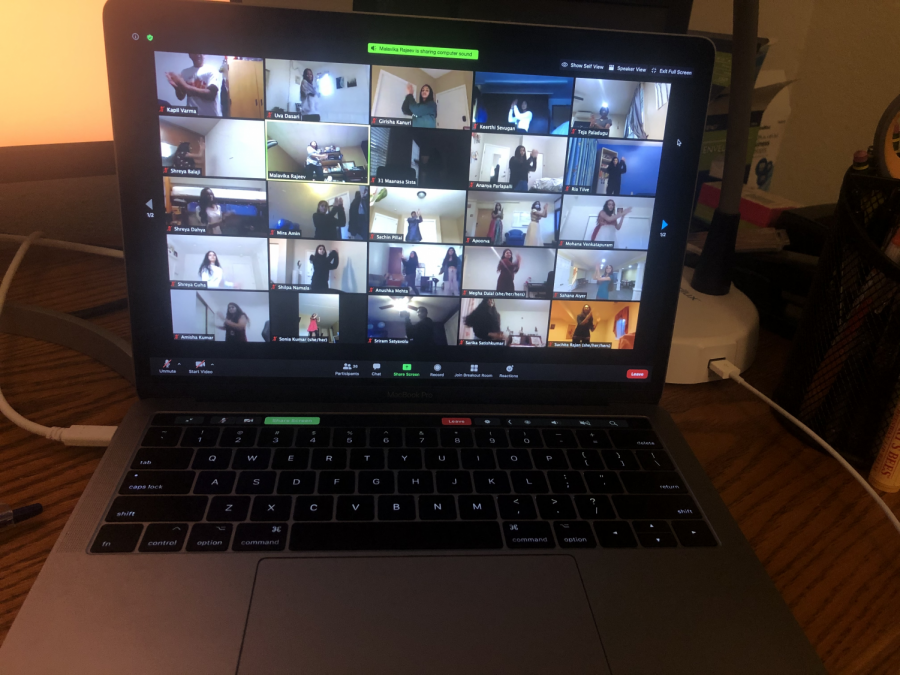uISA’s Garba returns as clubs navigate digital events
Dancing on a Zoom call? Welcome to uISA’s digital Garba event!
October 23, 2020
As the COVID-19 pandemic spread across the U.S. and incessantly dominated our lives since March, social interaction and events have become rare. This is news to no one, but as college campuses have adapted to the crisis, clubs have been in a bit of a dilemma. Events are what traditionally drive college life and culture, and allow people to cut back and have fun with their peers. How those events will now look has been an existential question for many event-based clubs, as they are forced to reconsider their purpose in digital campus life.
Event safety guidelines have gone out to clubs for those who still want to have physical events, but when half of Case Western Reserve University is away, that approach may seem futile and non-inclusive to those not on campus. As such, many clubs have transitioned to digital events in order to still effectively serve their purpose as places for students to meet and have fun.
One of the first articles I wrote for The Observer was my coverage of the Undergraduate Indian Student Association’s (uISA) Navratri Garba, so as it transitioned from a physical event to a digital one, it seemed appropriate to document the change and see if it has clues for how social life is changing in a COVID-19 world.
Held in a Zoom room on Saturday, Oct. 17 from 6-7 p.m., the event celebrated the ongoing Hindu festival of Navratri, which takes place over nine nights, celebrating the changing of the seasons and honoring the goddess Durga, or the god Rama, depending on which region of India you are in. Either way, the festivals celebrate the victory of good over evil and start the preparations for Hinduism’s most widely known holiday, Diwali, which usually occurs a month afterwards. Navratri celebrations typically include food, fun and lots of dancing, and uISA’s Garba usually packs the same. It was one of my favorite events of the semester last year, with fun tutorials for traditional Indian dances and an appropriately festive atmosphere.
This year, the celebrations were more restrained due to its inherent online nature, but the spirit was just as celebratory as usual. The event started off with a screen-shared presentation on the origins of Navratri and the garba dance from the first-year representatives of uISA before going into a Kahoot game about the information, which also served as a questionnaire about what future uISA events could look like, with a prize at the end for whoever won. (I won the Kahoot game, by the way.) While the usual garba dance style of spinning in concentric circles is obviously not possible in a Zoom room, members of the Case CobRAAS Indian dance team facilitated dance tutorials in breakout rooms before returning everyone to the main room to dance together while someone shared their computer audio of a traditional Indian song.
Afterwards, the traditional Indian practice of rangoli, which involves creating patterns with colored sand, was emulated as a member of uISA showed how to draw a pattern on her iPad, with everyone else following, and the best pattern selected for another prize giveaway. Finally, a screen-shared video of someone performing the aarti ritual of offering a flame to a statue of the goddess Durga ended the event, facilitated by the new Case Hinduism Club.
Yes, all the features of Zoom were fully used to the best of uISA’s abilities. While it may have felt stilted or awkward at times, that just comes part and parcel with digital events. Luckily, the event went smoothly, bouncing between cultural activity and more relaxed portions, creating a more chill environment.
Girisha Kanuri, fourth-year student and president of uISA, acknowledged the change, “This transition was difficult in the beginning because we basically had to start from scratch.” She also focused on the positives. “It’s been very fun coming up with new, creative ideas and taking advantage of the flexibility this semester offers,” Kanuri said. “Overall, we’re very proud of how Virtual Garba turned out, and we are looking forward to providing more opportunities to celebrate our roots and connect students together.”
Obviously, this situation is not ideal for anybody, and club events may never reach the same levels of prominence in campus life as long as coronavirus is a factor, but celebrating culture and life is now more important than ever. Though this is all a struggle, any attempt to connect students during these isolating times is worth it. Perhaps the lesson that this digital Garba event delivers is that no matter how different, awkward or pared down, campus life is still worth it—even digitally. As clubs continue to adapt, hopefully more events return to all of our CampusGroups pages. I know I’ll be looking forward to them.




